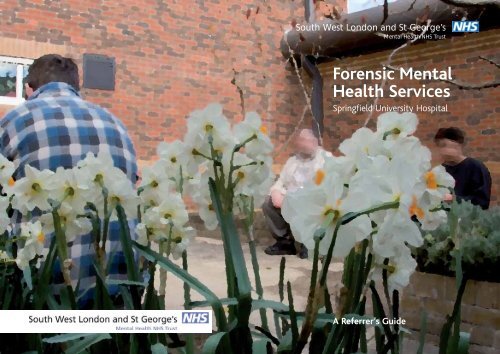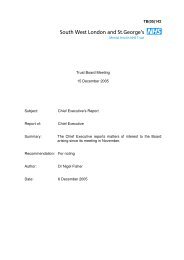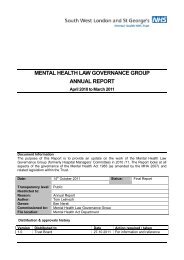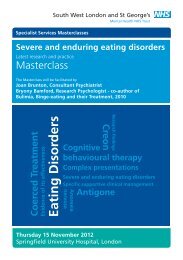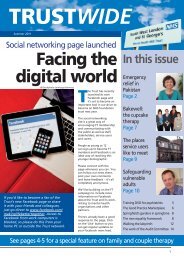Forensic Mental Health Services - South West London and St ...
Forensic Mental Health Services - South West London and St ...
Forensic Mental Health Services - South West London and St ...
Create successful ePaper yourself
Turn your PDF publications into a flip-book with our unique Google optimized e-Paper software.
<strong>South</strong> <strong>West</strong> <strong>London</strong> <strong>and</strong> <strong>St</strong> George’s<br />
<strong>Mental</strong> <strong>Health</strong> NHS Trust<br />
<strong>Forensic</strong> <strong>Mental</strong><br />
<strong>Health</strong> <strong>Services</strong><br />
Springfield University Hospital<br />
A Referrer’s Guide
1<br />
Who we are<br />
We are a multidisciplinary service with<br />
a total of 75 beds, comprising medium<br />
<strong>and</strong> low secure wards for men, <strong>and</strong> a<br />
medium secure women’s ward. We also<br />
have a Community <strong>Forensic</strong> Team <strong>and</strong><br />
a Sexual Behaviour Service.<br />
The inpatient service is configured<br />
as follows:<br />
Medium secure care<br />
■ Turner <strong>and</strong> Halswell Wards: both<br />
provide assessment <strong>and</strong> treatment<br />
for men; Halswell Ward has 16 beds<br />
<strong>and</strong> Turner Ward has 18 with 7 beds<br />
allocated for men requiring long term<br />
medium security.<br />
■ Ruby Ward: provides admission,<br />
assessment, treatment, <strong>and</strong><br />
rehabilitation for women requiring<br />
medium security.<br />
Springfield Wards
2<br />
3<br />
Who the service is for<br />
Low secure care<br />
■ Ellis Ward: provides long term<br />
rehabilitation to men in a low secure<br />
setting.<br />
■ Hume Ward: provides assessment<br />
<strong>and</strong> treatment for men requiring<br />
short to medium term admission.<br />
■ Rehabilitation flat: the service also<br />
has a flat within the Shaftesbury<br />
clinic that can be occupied by men<br />
or women in medium secure care<br />
who are preparing for discharge into<br />
the community.<br />
<strong>Mental</strong>ly disordered offenders who cannot<br />
be managed within the referring service.<br />
Typically, such patients will have:<br />
■ a diagnosis of severe <strong>and</strong> enduring mental<br />
illness <strong>and</strong>/or personality disorder<br />
■ complex needs, often including challenging<br />
behaviour <strong>and</strong>/or substance misuse<br />
■ a serious <strong>and</strong> ongoing risk of violence<br />
<strong>and</strong> injury to self or others <strong>and</strong>/or sexually<br />
inappropriate behaviour.<br />
Each ward has a multidisciplinary team<br />
consisting of a consultant forensic<br />
psychiatrist, junior medical staff, a social<br />
worker, psychologist, arts therapist,<br />
occupational therapist, a nursing team<br />
leader <strong>and</strong> ward nursing team.
4 5<br />
Referrals<br />
Referrers to the service include:<br />
■ secondary mental health services<br />
■ high secure services<br />
■ criminal justice system, eg probation, prisons,<br />
courts, solicitors<br />
■ social services<br />
■ multi agency public protection panels (MAPPA)<br />
■ borough placement panels<br />
We will accept referrals of patients who originate<br />
from one of our six commissioning PCTs providing<br />
that one of the following criteria is met:<br />
Routine referrals are assessed <strong>and</strong> reported back<br />
to the Referral <strong>and</strong> Bed Management Panel within<br />
two weeks. Emergency referrals should be seen<br />
within 24 hours <strong>and</strong> urgent referrals within five days.<br />
If a patient is not accepted for assessment, the<br />
relevant consultant will phone the referrer within<br />
48 hours of the panel’s decision, followed by<br />
a letter stating the reasons.<br />
We are available to offer consultancy <strong>and</strong> advice<br />
on the management of patients not formally<br />
referred to us.<br />
a) Clear evidence of a link or potential link<br />
between mental disorder <strong>and</strong> propensity<br />
to offend at the level of Admission Criteria<br />
for Secure <strong>Services</strong> Schedule (ACSeSS)<br />
categories 1 <strong>and</strong> 2<br />
b) Treatment in another service is considered<br />
unreasonable because of the risks<br />
as assessed.<br />
Once considered suitable for assessment, referrals<br />
will be allocated primarily on the basis of borough<br />
linked teams. Each forensic multidisciplinary team<br />
(MDT) will develop <strong>and</strong> maintain an active<br />
relationship with clinicians in their link borough.
6 7<br />
What we offer<br />
The philosophy of the service reflects the<br />
principles of recovery. At the heart of service<br />
delivery is the patient’s capacity, within the<br />
constraints of their legal detention, to achieve<br />
a degree of self determination. Fostering hope,<br />
sharing control, <strong>and</strong> providing meaningful<br />
opportunities for personal development <strong>and</strong><br />
social inclusion are among our primary goals.<br />
We provide consultation <strong>and</strong> liaison with adult<br />
mental health services within the trust, external<br />
assessments to prisons <strong>and</strong> special hospitals, <strong>and</strong><br />
mental health services to HMP W<strong>and</strong>sworth.<br />
The result of a multidisciplinary assessment will<br />
determine the patient’s care pathway which will<br />
be tailored to individual needs. One pathway<br />
will constitute a “treat <strong>and</strong> return” to prison<br />
where appropriate.<br />
<strong>St</strong><strong>and</strong>ard care pathway options are:<br />
Temporary: up to 3 months<br />
■ Temporary transfer from secondary mental<br />
health services<br />
■ Temporary readmissions<br />
■ Temporary recalls<br />
Short-term: up to 6 months<br />
■ Rem<strong>and</strong> prisoners transferred on <strong>Mental</strong><br />
<strong>Health</strong> Act (MHA) sections 48 <strong>and</strong> 49<br />
■ Sentenced prisoners transferred on MHA<br />
sections 47 <strong>and</strong> 49<br />
■ Patients rem<strong>and</strong>ed from the Courts on MHA<br />
sections 36 or 38<br />
■ Patients on trial leave from high security<br />
Medium term: up to 2 years<br />
Long term: more than 2 years<br />
■ Slow stream rehabilitation patients<br />
■ Long term rehabilitation, including factors<br />
such as long tariff or special Ministry of Justice<br />
concerns<br />
■ Long stay patients
8<br />
9<br />
What it’s like<br />
Each ward is served by a single MDT, with all<br />
teams adhering to st<strong>and</strong>ardised practice with<br />
regard to ward rounds, Care Programme Approach<br />
(CPA), <strong>and</strong> the implementation of the HCR-20 as<br />
a risk assessment tool for violence.<br />
A risk assessment will be conducted on the day<br />
of admission by a doctor <strong>and</strong> a nurse. This will<br />
determine the initial care plan implemented on<br />
admission, as co-ordinated by the consultant<br />
psychiatrist.<br />
All patients have access to a group treatment<br />
programme providing targeted input to tackle<br />
specific problems <strong>and</strong> behaviours <strong>and</strong> individual<br />
therapies are provided for those unable to access<br />
the group programme. An occupational therapy<br />
programme offers opportunities to develop skills<br />
<strong>and</strong> interests in creative, vocational, fitness <strong>and</strong><br />
life skills activities. There are opportunities to<br />
gain qualifications in a range of topics, including<br />
literacy, numeracy <strong>and</strong> computing <strong>and</strong> horticulture.<br />
Patients are involved in the development <strong>and</strong><br />
monitoring of their own care plans <strong>and</strong> will have a<br />
personal copy of these. The designated key worker<br />
will provide comprehensive information about the<br />
admission <strong>and</strong> ensure the patient’s awareness <strong>and</strong><br />
underst<strong>and</strong>ing on an ongoing basis.<br />
The patient’s risk assessment <strong>and</strong> care plan will<br />
be reviewed at least fortnightly within the multidisciplinary<br />
ward round. A case conference <strong>and</strong> CPA<br />
review will take place at least every four months.
10 11<br />
Discharges<br />
Community <strong>Forensic</strong> Team<br />
All patient discharges are effected through the<br />
CPA process, supported by a recent risk assessment<br />
<strong>and</strong> management plan. The patient will remain the<br />
responsibility of the <strong>Forensic</strong> Service until the CPA<br />
<strong>and</strong> a Section 117 aftercare plan have been accepted<br />
by the receiving service.<br />
Patients may be discharged to:<br />
■ the community under the care of the <strong>Forensic</strong><br />
Community Service, local Community <strong>Mental</strong><br />
<strong>Health</strong> Teams, or Assertive Outreach Team<br />
■ prison<br />
■ high secure hospital<br />
■ local in-patient services – acute, rehabilitation,<br />
or low secure.<br />
A dedicated Community <strong>Forensic</strong> Team (CFT) provides<br />
support, treatment <strong>and</strong> monitoring for patients meeting<br />
the CFT’s referral criteria, who are discharged back into<br />
the community, prior to their care transferring to local<br />
community teams. With a caseload of 40-50, the core<br />
function of the team is to support patients actively<br />
<strong>and</strong> to monitor their mental states <strong>and</strong> behaviour <strong>and</strong><br />
the risks they may pose. The CFT will then work<br />
closely with the service user’s CMHT to h<strong>and</strong> the<br />
care over to a local team. This may involve an initial<br />
period of joint working prior to a transfer of care.<br />
The CFT comprises three community psychiatric<br />
nurses (CPNs), one social worker, one occupational<br />
therapist, a staff grade doctor <strong>and</strong> one consultant<br />
psychiatrist. The CFT is also a training team <strong>and</strong> hosts<br />
medical <strong>and</strong> other professionals engaged in training.<br />
Interventions available to patients <strong>and</strong> their carers:<br />
■ Assistance to enable patients to develop skills in<br />
dealing with other agencies <strong>and</strong> with daily living<br />
■ Basic counselling as necessary<br />
■ Informal <strong>and</strong> formal mental state assessments<br />
■ Screening for substance misuse as required<br />
■ Support <strong>and</strong> education about healthy living,<br />
interpersonal, sexual, <strong>and</strong> cultural needs<br />
■ Reassessment of risks in step with changing<br />
circumstances.
12<br />
Contact details<br />
<strong>Forensic</strong> <strong>Mental</strong> <strong>Health</strong> Service<br />
Building 10<br />
Springfield University Hospital<br />
61 Glenburnie Road<br />
<strong>London</strong> SW17 7DJ<br />
Tel: 020 3513 6060<br />
Fax: 020 3513 3450<br />
How to find us<br />
The nearest tube station to Springfield Hospital is<br />
Tooting Bec (Northern Line), a 12-15 minute walk.<br />
Bus G1 serves Springfield Hospital itself. On nearby<br />
Trinity Road there are buses 219 <strong>and</strong> 319. On<br />
Upper Tooting Road there are buses 57, 155, 219<br />
<strong>and</strong> 355. On Tooting Bec Road there are buses 249<br />
<strong>and</strong> 319.<br />
Design from The Drawing Room www.drawingroom.uk.com Photography by Paul Lapsley<br />
Revised March 2011


